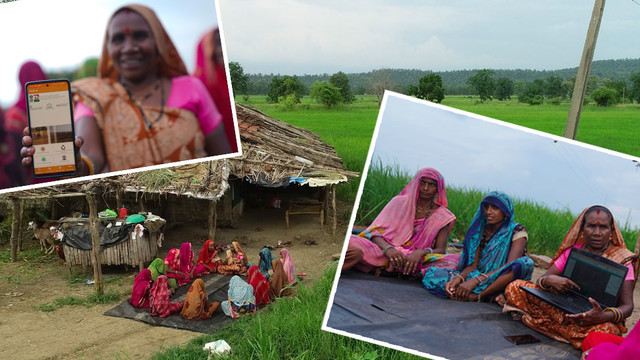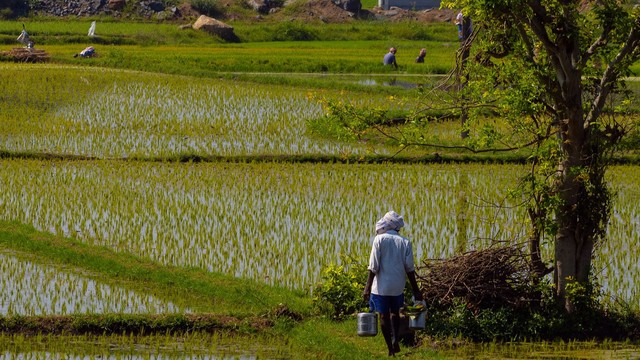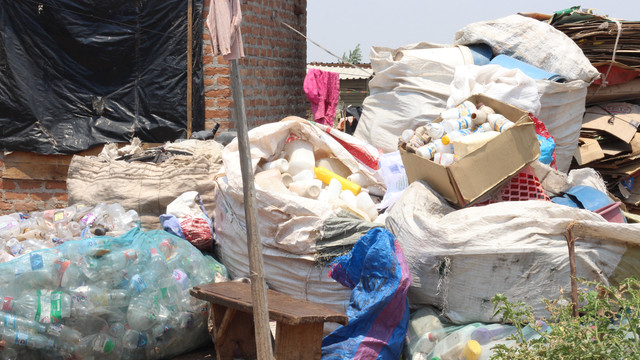COVID Relief Archive for Lessons on urban Social Protection (CORALS)
What lessons can we learn from how relief efforts delivered social protection to informal workers and informal settlements during the COVID-19 pandemic? This archive features articles, publications, videos and more highlighting lessons from Delhi and Jaipur in India, and Harare in Zimbabwe.
IIED, the Indian Institute for Human Settlements and Dialogue on Shelter Trust have analysed a range of relief efforts implemented by state and non-state actors that were specifically developed for informal settlements and informal workers in Delhi, Jaipur (and other parts of Rajasthan) and Harare during the COVID-19 pandemic.
The analysis focused on developing policy and programming lessons for:
- Urban social protection at times of crisis, and
- Efforts to build more resilient cities post-crisis, with a focus on lessons that ensure the inclusion of informal workers and settlements.
Our research has found specific lessons for social protection delivery in the context of informal work and settlements in cities, leading to this COVID relief archive for lessons on urban social protection.
This archive of relief initiatives in housing, water and sanitation, food security, income and wage transfers for informal workers across Delhi, Rajasthan and Harare also identifies programming and policy opportunities for institutionalising and scaling up interventions.
The contents of the archive consider how relief efforts anticipated the challenges of delivering social protection to informal workers or within informal settlements, and how they designed relief to be effective within these contexts.
The archive was launched at an online event in November 2023 featuring speakers involved in the work in India and Zimbabwe, and a video recording of the discussion is available.
This work was funded by the Covid Collective (supported by the UK Foreign Commonwealth and Development Office (FCDO)).
Key partners and their role
IIHS is a national education institution committed to the equitable, sustainable and efficient transformation of Indian settlements.
The institute aims to produce a new generation of interdisciplinary urban practitioners, innovators and scholars who have the knowledge, skills and perspectives to tackle the problems of 21st century urbanisation, via cutting-edge practice, teaching and globally benchmarked research.
A network of nearly 40 organisations that came together during the second wave of COVID-19 in 2021 in a remarkable effort to undertake the work of food relief in New Delhi, the group had members from membership-based organisations of workers in the informal economy, community-based organisations, worker unions, NGOs, individuals and resident activists.
It focused on one form of food relief – the delivery of kits of dry food rations to families which they could use for a month – and distributed nearly 75,000 such kits from April to June 2021. In retrospect, by several measures, the Delhi group was a success.
RMKU is a membership-based organisation and a registered trade union for domestic workers that has been active for 14 years in Jaipur, Rajasthan. During this time it has strengthened the voice of domestic workers in their struggle against unfair wages and employment practices, workplace harassment and domestic violence, and carved a political space to demand decent work, dignity and a better life for themselves.
During the COVID-19 crisis, it played a pivotal role in ensuring the inclusion of domestic workers in certain city-level relief plans and enabled both state and non-state actors to extend food, financial and other relief programmes to domestic workers within the city. It also assisted in safeguarding the earnings, employment and housing of domestic workers.
The alliance of the Zimbabwe Homeless People’s Federation (ZIHOPFE), the Zimbabwe Young People’s Federation (ZYPF), and Dialogue on Shelter for the Homeless in Zimbabwe Trust is a partnership between a social movement of the urban, rural poor and an NGO. The alliance works to address poverty among slum dwellers through women and youth-led approaches and strategies.
ZIHOPFE is an autonomous network of community-based organisations with members from residents in slums, informal settlements and backyard shacks in towns, cities and peri-urban areas as well as in rural areas in Zimbabwe. The slum dwellers lack access to land and secure tenure, shelter, adequate water and sanitation, income opportunities and food security.
ZYPF focuses on the needs of young people within the communities served by ZIHOPFE.
Dialogue on Shelter supports the initiatives of ZIHOPFE and ZYPF and other organised communities of the urban poor to find collective solutions to problems they face. It facilitates capacity-building, training and spaces for connection and influence between communities and government, private sector and academic institutions.
It helps people living in poverty to access resources and address systems and practices that hinder affordable housing and infrastructural services.
One of the world’s leading independent policy and action research organisations, IIED's mission is to build a fairer, more sustainable world, using evidence, action and influence in partnership with others.
Its Human Settlements research group works through partnerships to create towns and cities that are sustainable, prosperous, resilient, healthy and safe, and inclusive and equitable. It does this by generating high quality evidence, shaping debates, building coalitions, and influencing policies and practices at multiple scales.
Delhi
India's capital, and the country's second biggest city, Delhi had a population of over 11 million people in 2011, the time of the last census, and this is now believed to be over 32 million, spread over 1,484 square kilometres.
While poverty has steadily declined in India over the last two decades, the COVID-19 pandemic showed that vulnerability, even for employed urban workers, remains high. In Delhi, six million people applied for state emergency food support beyond the 7.2 million already covered by the National Food Security Act.
The role played by non-state actors – trade unions, worker organisations, civil society groups and individual networks – was pivotal in providing support across neighbourhoods, communities and worker groups. These groups had well established infrastructure, and were networked, recognised and equitably distributed before the pandemic, enabling them to respond to the crisis and lockdowns more quickly, more efficiently and more sustainably to provide what was needed, including food relief.
A series of videos about the Delhi Coordinated Relief network explore its impact, including the interview below highlighting how more than 50 civil society organisations, community-based organisations and activists worked together to distribute more than 75,000 food kits to beneficiaries.
And a policy briefing reflects on the lessons for social protection design and delivery in megacities in the global South.
Jaipur
Jaipur is the capital and largest city of the Indian state of Rajasthan. As of 2011, the city had a population of 3.1 million, making it the tenth most populous city in the country, and this is now estimated to be over four million.
Rental housing is a key form of access to housing for migrants in the city. Inability to pay rent during COVID-19 lockdowns resulted in significant financial duress for those largely living on rent such as domestic workers in Jaipur, leading them to return to work at lower salaries and longer hours of work and setting back years of union negotiation to assert labour rights.
One organisation that had a significant impact was the Rajasthan Mahila Kaamgar Union, which extended access to cash transfers and provided food and housing relief to domestic workers. It identified 7,000 of the most vulnerable domestic workers for a state cash transfer and provided the government with relevant information, including bank account details, to ensure delivery.
The union also repeatedly intervened to ensure protection against evictions and to negotiate rental waivers and moratoriums. And its securing of social protection during the pandemic, in the form of financial support for domestic workers, helped thousands of people. One of its key roles was to represent domestic worker’s interest with the state as well as in non-state networks.
But what were the lessons for strengthening the delivery of social protection to informal workers, and why should rent be considered not just as relief but as a basic tenet in urban social protection frameworks?
Explore the Harare archive
- Community participation in the distribution of state and non-state relief in Harare during COVID-19
- Social protection and urban informality
- Getting social protection to the most vulnerable
- Improving social protection for low income and informal settlements
- The significance of community savings groups in informal settlements
- How COVID-19 affected informal livelihoods in Harare
- Lessons from the pandemic: recommendations for urban stakeholders
- Understanding the long-term social and economic impacts of COVID-19 in low income urban communities
- Resilient livelihoods during COVID-19: photo gallery
Harare
The capital and largest city in Zimbabwe, with a population of almost two million people in the 2022 census, Harare extend over 982 square kilometres. The research in Harare was carried out in three settlements: Tafara, Caledonia and Hopley.
Tafara is located in the east of Harare, the Tafara area has around 850 households, with an estimated 5,950 people. The Zimbabwe Homeless People's Federation has been granted plots of land, where it is establishing essential services such as water, sewer systems, roads and electricity. The beneficiaries of these plots in Tafara are the urban poor, who currently rely on communal water and sanitation facilities because they have not yet been connected to Harare’s electricity grid.
Caledonia was established in 2000 during the period of Operation Restore Order/Murambatsvina, and has no access to basic services and infrastructure. Its development was disorganised, prompting the government to take steps to formalise it by forming cooperatives and devising a layout plan. Negotiations were conducted with a white owner of the farm to accommodate displaced residents from different areas in Harare who had been evicted from their previous dwellings. In 2003, another set of cooperatives, led by different political leaders, was formed. An office was established where these cooperatives could join and collaborate.
Hopley is 13km south of Harare and was established in 2005, With an estimated population of 200,000, it evolved as a relocation site for evictees under Operation Garikai, which was launched soon after Operation Murambatsvina. The settlement, which lacks basic services and infrastructure, is divided into six zones and a significant number of people came from evicted households. The Zimbabwe government provided secure land allocations in Hopley averaging 200sqm plots, and some families were later moved into two-roomed housing units.
With COVID-19 affecting informal economy workers across Africa and globally, in Harare local forms of social protection helped many cope with the economic and health consequences, as they lacked access to social insurance or assistance for extreme poverty.
Community savings groups provided crucial emotional and financial support to their members while two video case studies show how livelihoods were affected by the pandemic.
While lockdowns may have ended, community focus groups reveal the long-term social and economic impacts on their everyday life, and there are also reflections on the effectiveness of social protection schemes in Zimbabwe and the changing relationships with government.
After concerns over the lack of transparency and inclusivity in Zimbabwe social protection programmes targeting beneficiaries during and after the pandemic, communities provide a series of recommendations and highlight the lessons from events during the crisis.
Find out more
The Covid Collective research platform offers rapid social science research to inform decision-making on some of the most pressing development challenges related to COVID-19.
Read more on IIED's work to address urban environmental issues for cities that work for people and planet.
Contact
Anna Walnycki (anna.walnycki@iied.org), principal researcher, IIED's Human Settlements research group






